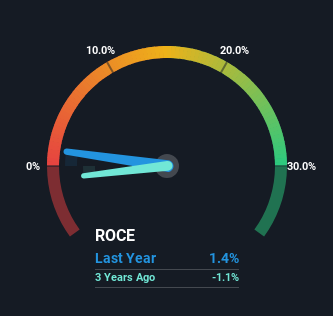- Germany
- /
- Electric Utilities
- /
- DB:LEC
Some Investors May Be Worried About Lechwerke's (FRA:LEC) Returns On Capital
If we're looking to avoid a business that is in decline, what are the trends that can warn us ahead of time? When we see a declining return on capital employed (ROCE) in conjunction with a declining base of capital employed, that's often how a mature business shows signs of aging. Basically the company is earning less on its investments and it is also reducing its total assets. In light of that, from a first glance at Lechwerke (FRA:LEC), we've spotted some signs that it could be struggling, so let's investigate.
Understanding Return On Capital Employed (ROCE)
If you haven't worked with ROCE before, it measures the 'return' (pre-tax profit) a company generates from capital employed in its business. The formula for this calculation on Lechwerke is:
Return on Capital Employed = Earnings Before Interest and Tax (EBIT) ÷ (Total Assets - Current Liabilities)
0.014 = €9.3m ÷ (€1.8b - €1.1b) (Based on the trailing twelve months to June 2024).
Therefore, Lechwerke has an ROCE of 1.4%. Ultimately, that's a low return and it under-performs the Electric Utilities industry average of 7.6%.
Check out our latest analysis for Lechwerke

While the past is not representative of the future, it can be helpful to know how a company has performed historically, which is why we have this chart above. If you'd like to look at how Lechwerke has performed in the past in other metrics, you can view this free graph of Lechwerke's past earnings, revenue and cash flow.
So How Is Lechwerke's ROCE Trending?
In terms of Lechwerke's historical ROCE trend, it isn't fantastic. Unfortunately, returns have declined substantially over the last five years to the 1.4% we see today. In addition to that, Lechwerke is now employing 60% less capital than it was five years ago. The combination of lower ROCE and less capital employed can indicate that a business is likely to be facing some competitive headwinds or seeing an erosion to its moat. If these underlying trends continue, we wouldn't be too optimistic going forward.
While on the subject, we noticed that the ratio of current liabilities to total assets has risen to 61%, which has impacted the ROCE. Without this increase, it's likely that ROCE would be even lower than 1.4%. What this means is that in reality, a rather large portion of the business is being funded by the likes of the company's suppliers or short-term creditors, which can bring some risks of its own.
Our Take On Lechwerke's ROCE
In short, lower returns and decreasing amounts capital employed in the business doesn't fill us with confidence. It should come as no surprise then that the stock has fallen 13% over the last five years, so it looks like investors are recognizing these changes. That being the case, unless the underlying trends revert to a more positive trajectory, we'd consider looking elsewhere.
Like most companies, Lechwerke does come with some risks, and we've found 1 warning sign that you should be aware of.
While Lechwerke isn't earning the highest return, check out this free list of companies that are earning high returns on equity with solid balance sheets.
New: AI Stock Screener & Alerts
Our new AI Stock Screener scans the market every day to uncover opportunities.
• Dividend Powerhouses (3%+ Yield)
• Undervalued Small Caps with Insider Buying
• High growth Tech and AI Companies
Or build your own from over 50 metrics.
Have feedback on this article? Concerned about the content? Get in touch with us directly. Alternatively, email editorial-team (at) simplywallst.com.
This article by Simply Wall St is general in nature. We provide commentary based on historical data and analyst forecasts only using an unbiased methodology and our articles are not intended to be financial advice. It does not constitute a recommendation to buy or sell any stock, and does not take account of your objectives, or your financial situation. We aim to bring you long-term focused analysis driven by fundamental data. Note that our analysis may not factor in the latest price-sensitive company announcements or qualitative material. Simply Wall St has no position in any stocks mentioned.
About DB:LEC
Established dividend payer with adequate balance sheet.
Market Insights
Community Narratives



